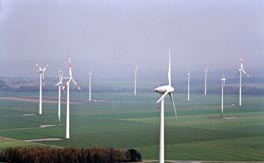Policing carbon markets
Carbon markets have emerged in recent decades as one of the most important tools for curbing industrial greenhouse gas emissions, but they present a number of novel enforcement challenges when compared
Carbon markets have emerged in recent decades as one of the most important tools for curbing industrial greenhouse gas emissions, but they present a number of novel enforcement challenges when compared
The UNEP Finance Initiative is a unique global partnership between the United Nations Environment Programme and over 170 financial institutions from the banking, investment and insurance sectors across the globe. The Initiative aims to promote linkages between the environment, sustainability and financial performance through a comprehensive work programme, including research and training.
This report makes clear that there are many different approaches to renewable energy policy. Many factors influence the approaches that local governments choose. Some of these include geographic resource availability, financing availability, relationship to state and national governments, local regulatory authority and legal jurisdiction, social and cultural conditions,
This brief demonstrates that Renewable Energy Certificates (RECs) sold in either voluntary or mandatory environmental markets are not equivalent to GHG emission offsets. The first
The CO2 emission performance standard policies outlined in this paper could complement a cap-and-trade program that puts a price on carbon and serve to significantly reduce the CO2 emissions from coal use for electricity generation.
Exxon Mobil Chairman Rex Tillerson issued a ringing defense of the oil titan at the company

Renewable sources accounted for 56 percent of investment dollars, worth $140 billion, while investment in fossil fuel technologies was $110 billion according to this new UN report. It highlights how investment in developing countries in 2008 had surged forward by 27 percent to $36.6 billion, and now accounted for nearly one third of global investments.
The best way to curb global warming would be a carbon tax. The money raised could be divided up among citizens or used to repay the national debt. A tax on carbon dioxide (CO2) would give everyone an incentive to emit less of it. It would be simple, direct and transparent. For these reasons, it will never happen in America.
Mumbai: The turmoil in the financial world notwithstanding, 2008 saw a doubling of the global carbon market to an estimated over $126 billion, according to the latest World Bank report
Carbon market professionals hope speedy U.S. Congressional approval of a federal cap and trade scheme will boost emissions trading, which is threatened by recession and slow U.N. climate talks.
Global emissions of the main greenhouse gas carbon dioxide will jump more than 39 percent by 2030 without new policies and binding pacts to cut global warming pollution, the top U.S. energy forecast agency said on Wednesday. Nearly 200 nations are set to meet late this year in Copenhagen to hash out a new agreement to control greenhouse gases as the Kyoto Protocol expires in 2012.